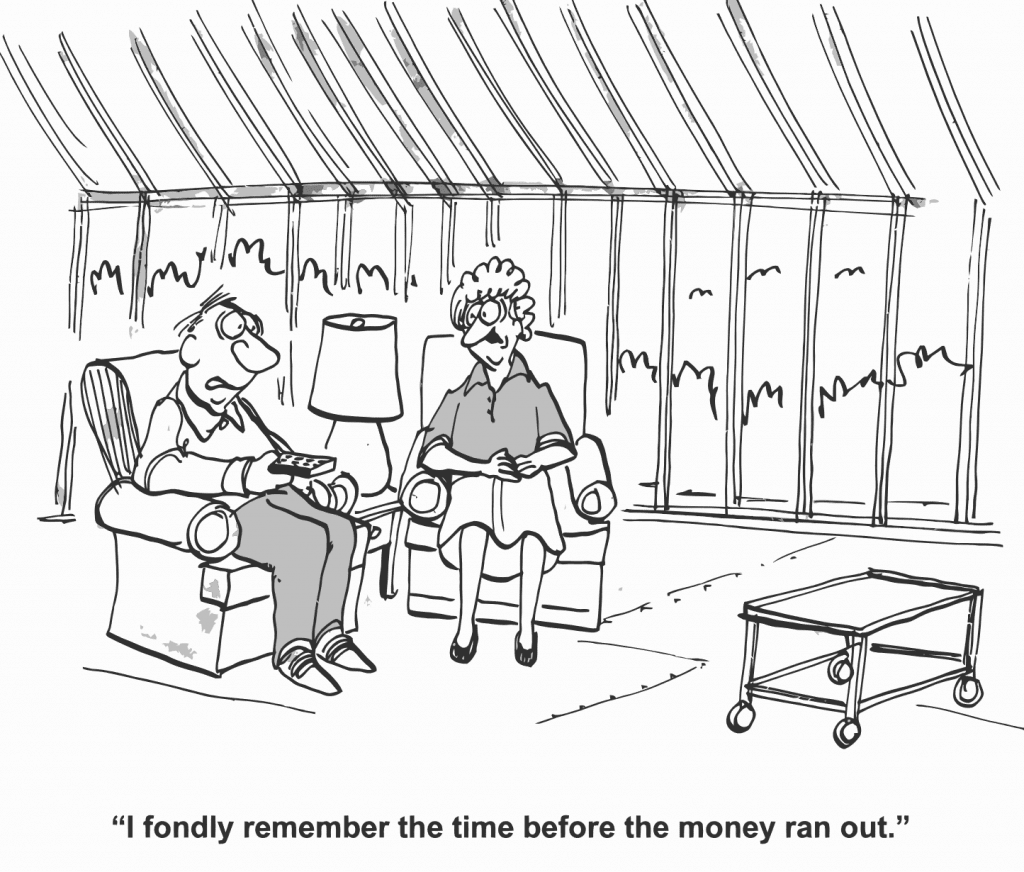For decades, Baby Boomers have watched their home values soar and benefited from traditional pension plans. But despite these advantages, many Boomers face an uncertain financial future—concerned about running out of money, rising healthcare costs, and losing financial independence. These concerns are valid, yet conventional financial strategies often fall short in providing true peace of mind.
At Paradigm Life, we believe that financial confidence is possible at any age. Understanding the key challenges Baby Boomers face is the first step in securing lasting financial stability. Let’s explore the top three concerns and how a smarter wealth strategy can help overcome them.
Concern #1: Running Out of Money Too Soon
Boomers have worked hard to save for retirement, often with a specific target in mind. But is that target enough? Will they have enough to live comfortably on for the rest of their lives? Traditional financial plans rely on unpredictable market-based assets that are vulnerable to inflation, economic downturns, and sequence of returns risk.
Without a financial strategy that prioritizes certainty and control, many retirees face an unsettling question: Will my money last as long as I do?
A Smarter Approach
Instead of relying solely on market-dependent savings, The Perpetual Wealth Strategy™ provides a cash flow-focused approach that allows assets to grow and remain accessible throughout retirement. This strategy leverages properly structured whole life insurance to create guaranteed, tax-efficient income streams, mitigating the risks of outliving savings.
Concern #2: Rising Healthcare Costs
Medical costs continue to rise, and with them, anxiety about how to afford quality care. Many Boomers assume Medicare will cover their needs, only to discover costly gaps in coverage. Long-term care, prescription costs, and unforeseen medical expenses can erode even the most well-planned retirement savings.
A Smarter Approach
Rather than hoping for political or economic stability, The Perpetual Wealth Strategy™ emphasizes liquid, protected assets that can be accessed for medical costs without disrupting long-term financial security. Options like asset-based long-term care insurance and whole life insurance with living benefits provide a built-in safety net, ensuring access to quality care without draining other investments.
Concern #3: Maintaining Financial Independence
Boomers take pride in their independence. But rising inflation, unpredictable markets, and longer life expectancies create a real fear: Will I become a financial burden on my children?
A Smarter Approach
With the right strategy, Baby Boomers can maintain financial control and flexibility throughout their later years. The Perpetual Wealth Strategy™ emphasizes cash flow certainty, allowing Boomers to:
- Access capital without selling off assets at a loss during market downturns.
- Utilize The Volatility Buffer Strategy to withdraw from liquid, non-market-based assets during economic downturns.
- Ensure tax-efficient wealth transfer through properly structured whole life insurance.
The Hidden Dangers of Traditional Retirement Strategies

Many Baby Boomers follow conventional wisdom when it comes to retirement planning, but these traditional strategies come with risks:
- Relying on the 4% rule: This strategy assumes steady market growth, but in reality, market downturns can accelerate depletion.
- Over-dependence on market-based assets: Boomers who rely solely on 401(k)s and IRAs lack financial flexibility in volatile markets.
- Tax Inefficiencies in retirement: Withdrawals from tax-deferred accounts (like 401(k)s) are taxed as income, potentially pushing retirees into higher tax brackets.
Solution: The Perpetual Wealth Strategy™ mitigates these risks by focusing on cash flow certainty, tax efficiency, and wealth protection.
How Whole Life Insurance Supports Baby Boomers at Every Stage
A properly structured whole life insurance policy isn’t just about leaving a legacy—it’s an active financial tool that supports Baby Boomers before, during, and after retirement:
Stage of Life | How Whole Life Helps |
Pre-Retirement (50s-60s) | Builds cash value, creating a liquid, tax-advantaged financial resource. |
Retirement (60s-70s) | Provides a Volatility Buffer to prevent losses from selling investments in a down market. |
Later Retirement (70s-80s+) | Offers living benefits for long-term care or unexpected medical costs. |
Estate & Legacy | Ensures a tax-free transfer of wealth, avoiding probate delays. |
By integrating whole life insurance into their retirement strategy, Baby Boomers gain more control over their money—both now and in the future.
The Family Bank: Teaching Wealth Stewardship to Future Generations
One major concern Baby Boomers have is ensuring their wealth is managed wisely by their children and grandchildren. The Family Bank Strategy—a core component of The Perpetual Wealth Strategy™—provides a structured way to:
- Teach financial responsibility by lending to family members rather than gifting money.
- Encourage wealth-building behavior, ensuring future generations don’t squander their inheritance.
- Provide intergenerational liquidity, helping family members invest in business opportunities, education, or real estate without relying on banks.
Example: Instead of leaving a lump sum to their children, a Boomer couple could structure their legacy through a Family Bank, allowing wealth to grow tax-efficiently while supporting their family’s financial goals.
Steps Baby Boomers Can Take Today to Secure Their Financial Future
Many Baby Boomers believe it’s too late to improve their financial situation, but taking proactive steps now can significantly enhance financial stability, tax efficiency, and wealth preservation. Instead of relying on traditional strategies that often lead to uncertainty, Boomers can shift to an approach that prioritizes cash flow, liquidity, and protection.
1. Assess Current Assets & Risks
Understanding your financial position is the first step toward long-term security. Many Boomers have assets in 401(k)s, IRAs, pensions, real estate, and Social Security, but how efficiently are these assets working?
Key questions to consider:
- How much of my wealth is tied to market-based assets?
- Do I have sufficient liquidity for unexpected expenses?
- Am I overpaying in taxes due to required minimum distributions (RMDs)?
- Do I have a plan in place to protect my assets from market downturns, inflation, and long-term care costs?
Without a clear assessment, retirees risk financial instability. A well-structured plan ensures security and predictability.
2. Reduce Dependence on Market-Based Assets
Many retirees rely too heavily on market-dependent assets, leaving them vulnerable to economic downturns. The risks include:
- Sequence of Returns Risk: Withdrawing funds in a declining market accelerates asset depletion.
- Liquidity Constraints: 401(k) and IRA funds are restricted until age 59½, limiting financial flexibility.
- Tax Exposure: Withdrawals from tax-deferred accounts are taxed as ordinary income, increasing tax liability.
A better strategy involves shifting from an accumulation mindset to a cash flow-focused approach. Diversifying income sources, incorporating non-market-based assets like whole life insurance, and utilizing guaranteed income sources help create stability.
3. Create a Volatility Buffer
Market volatility can threaten retirement security. A Volatility Buffer is a liquid financial resource that is not tied to market performance, allowing retirees to access funds without selling investments at a loss.
Whole life insurance cash value serves as an effective Volatility Buffer by:
- Growing tax-deferred while remaining accessible.
- Allowing tax-free policy loans to cover expenses.
- Providing financial stability in unpredictable markets.
4. Optimize for Tax Efficiency
Many retirees underestimate the impact of taxes on their retirement income. Issues such as RMDs, Social Security taxation, and Medicare surcharges can erode wealth.
Tax-efficient strategies include:
- Using whole life insurance cash value for tax-free withdrawals.
- Converting a portion of tax-deferred accounts into a Roth IRA to reduce future tax burdens.
- Balancing taxable, tax-deferred, and tax-free income sources for greater flexibility.
By managing tax exposure strategically, retirees can preserve more of their wealth for future use.
5. Implement a Wealth Transfer Strategy
Effective estate planning ensures that wealth is passed down efficiently without unnecessary tax burdens or legal complications. Common risks include:
- Estate taxes and probate costs.
- Heirs unprepared for financial responsibility.
- Tax consequences from improperly structured inheritances.
Whole life insurance offers a tax-free wealth transfer, bypasses probate, and provides immediate liquidity. A Family Bank Strategy can help educate heirs on responsible financial management, while trusts can structure asset distribution for long-term security.
FAQ: Baby Boomers & Financial Security
What are the top financial concerns for Baby Boomers?
The primary concerns include running out of money, rising healthcare costs, and maintaining financial independence.
Why do Baby Boomers worry about running out of money?
Traditional retirement strategies rely on market-based assets that are vulnerable to downturns and inflation. Without a certainty-focused approach, retirees risk outliving their savings.
How can Baby Boomers prepare for rising healthcare costs?
By incorporating asset-based long-term care insurance and leveraging the cash value of whole life insurance, Boomers can access funds for medical expenses without disrupting their overall financial plan.
What can Baby Boomers do now to protect their financial independence?
Shift to a cash flow-driven strategy. Whole life insurance, The Volatility Buffer, and other liquidity-focused strategies provide stable income without relying on unpredictable markets.
It’s Not Too Late to Take Control
Contrary to popular belief, it’s never too late to optimize your financial future. By shifting focus from accumulation-based strategies to a cash flow, protection, and wealth-focused approach, Baby Boomers can enjoy financial independence for life.
If you want to learn how to optimize your retirement income and secure your financial future with certainty, visit Paradigm Life today.









